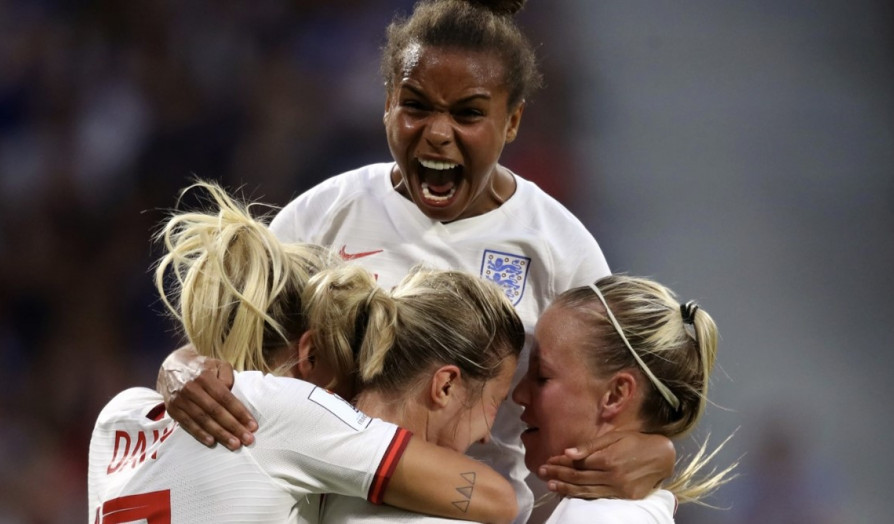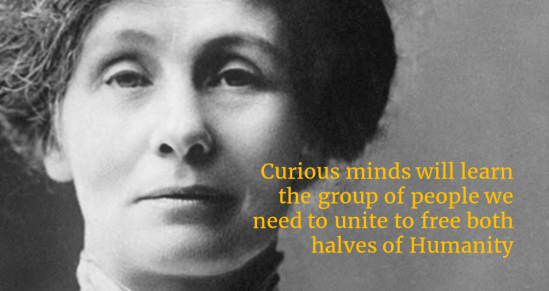Jubilant men and women across the country are united in spontaneous celebration at England's historic victory yesterday after deposing serial winners Germany 2-1 in extra-time at the Euro 2022 Women's Football championship final. The last time England's Men achieved such a feat was 56 years ago at the 1966 World Club. Our nation awash with male fans donning England shirts with their favourite female icons' names emblazoned on the back, and Caroline's everywhere succumbing to rapturous serenades for their sweetness. National unity on this scale is rare, proving yet again that our obsession with Men's sport over all else is a crux of lost potential - both for women and for humanity - that we all bear responsibility for.
Isn't it discrimination to even have a Women's football tournament?
First off, nobody asks that about Men's football, but since you asked...
Science tells us consistently that when it comes to the things that matter for our businesses – drive, capability, talent, determination, creativity, intelligence, teamwork – there is no systematic difference between any subset of human beings. The structural inequity and performance biases within our culture today are wholly artificial, taught and learnt social constructs that hold back humanity from even greater achievement.
Some forms of discrimination are permitted under the Equality Act, providing the diversity layers are legally, morally and scientifically justified to the fair and effective workings of that unit. So yes, excluding men from a women’s football team is totally fine.
“We always pick the best person for the team. White men just perform best.”
But what if we also excluded brunette women for ‘underperformance’, or only shorter women made the cut? What if all black or lesbian players suddenly fell short of the standard expected? Would England still have won?
As team coach to a now losing team, you are landed with two options:
Option 1: You accept what you see and deem the subgroups (not the football club) are to blame for this odd underperformance.
Option 2: You reject what you see and probe deeper to discover the true cause:
Are these subgroups genuinely underperforming and if so, what (or whom) is inhibiting them and how can you help them perform at their best? If the subgroups are performing just as good, is your system for evaluating their ability biased in some way and how can it be made more fair?
So what changed this time?
Fortunately for England and despite the immense pressure to perform, Manager Serina Weigman - often described as ruthless for her focus on success and attention to detail - had this conversation with herself and her team long before the tournament even began. She knew her players intrinsic strengths and weaknesses would define victory or defeat, not their extrinsic characteristics. And at the crucial moment, Weigman made all that count as she substituted in Chloe Kelly who, according to at least one outlet, 'seductively' removed her top as she rightfully celebrated making history with her winning goal in extra time by emulating mundane male celebratory behaviour at less significant victories.
Earlier, 87,192 fans had swarmed Wembley Stadium to witness the Lionesses victory, making it the largest ever crowd for any European football tournament in history. Their ubiquitous roars, whistles, cheers and chants providing vital moral support and encouragement to a now exhausted home squad as the match entered extra time.
Following the match, team captain Leah Williamson cited often forgotten women's football hero Carol Thomas as the trail blazer who cleared the path for England's victory. Making captain of the Lionesses aged just 20, Thomas landed a record breaking 56 caps to her name across 9 years at the top between 1970's and 80's - a record that was only surpassed in 2011 by Faye White - and led her team to victory at the 1976 Pony Internationals, and to the finals of the 1984 UEFA Championships. But her work didn't stop as she walked off the pitch. Her tireless efforts and collaboration elevate the appeal of women's football that are widely credited with garnering it official recognition by the UK Football Association in 1992. Man or woman, her achievements are phenomenal by any standard, proving that success and leadership are not exclusive masculine traits. And yet Thomas saw very little publicity or recognition for her ground breaking efforts, until now.
So what's better, Men's Football or Women's Football?
That depends on how you judge superiority, although ideally it would be best to remember that gender is purely a label with no bearing on behaviour or capability, so why ask in the first place?
On the numbers: With 17.4m people tuning to watch England take home gold, this was the UK's most watched TV moment so far in 2022, making it 30% more engaging than the Queen's Platinum Jubilee in June, though still down -44% on England's Men losing the Euro 2020 final last year to Italy - that peaking at 30.95m viewers.
On the game: A lack of privilege and opportunity tests you to become better and try harder. Though women's football is attracting more money, sponsorship and salaries than ever before, it remains by far the underdog when it comes to gender. This inequity has led the the Football Association to come up with creative ways to differentiate the sport from its male equivalent, often citing it as a 'cleaner, more wholesome' version of football. As one fan (male, 36–45, Liverpool) put it to The Conversation back in 2015, “One of the main things I have noticed in the woman’s game is the lack of diving and the higher level of respect and sportsmanship... the girls are lot more respectful to the ref and other players than the boys.”
On the impact: Role models come in all shapes and sizes. Though there is no understating the success of Williamson and her team today, the full legacy and significance this moment carries for inspiring broader female talent and motivating change not just in football but across society will undoubtedly be felt long after yesterdays events.
Need help building your team?
If our goal is a winning team, even if we are limited to just women, the answer cannot be a team of identical robots but one of diverse skills, backgrounds and experiences. At Deilight, we see what others can't see by looking beneath the labels to help you attract, nurture and champion winning teams that include all the arbitrary differences - none better or worse than each other, but each with their individual strengths and weaknesses.
.png)



